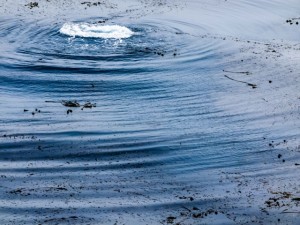Pacific
The bends, tentacles, the sea inside the shell’s ear,
bioluminescent squid, tantalized.
Opaque suck and heave, watershed, whirlpool, eddy,
siphon, down the whirl, salt-bed, buoyant floating
trunks, storm-drowned trees. The roll of rocks abrading
bottom, shore to gravel, sand to silica, refractive look
and reflect. Earth is selvedge, dregs, not the swarm
of molecules, delight raised to a liquid power, no solid
can penetrate like water, overlap in lap, in lip, the other side
of blood’s map of veins, rinsing up from gill to tadpole,
crawl to land. Lightening bolt, chemical sparks to life,
shape, hump, tail-frill, tide pool, electric transformers,
the surge and suck, silting down the food chain, everyone
licking everyone with microscopic mouths.
Caribbean
Gulf stream, trade winds, well-tempered
clavicles, the sturdy bone’s S curve to hinge
a wing. One sea-swift, before hurricane season,
sloshing drink, tilted windward parasol, so adult,
spilled sideways. Cricket test match. Exiles, dying
coral reefs, steel drums, nutmeg, vanilla, coconut
Cayman Trench. The surf-swells come from Africa.
A towel with clowns, raft of air,
punctured colonization, sharks.
Contact with Europe decimated the indigenous population which rose again as slaves were forced from West Africa. The giant ground sloths (90 kg.), now extinct, may have survived in the Cuban highlands until the 15th c. Casino lights lure turtle hatchlings away from the sea since they navigate by finding the moon reflected in water, wasted eggs have a protein price.
Trying to follow a group of stars, sailors realized the sky kept moving, so tried to locate something still in that thick mass of light. Polaris moved only inches over ages. Magnetic poles’ slow shift, sails multiplied and larger hulls became buildable, tools, taxes and all that plotting, spice route, slave trade, long-sought lands of gold and dominion. After starlight money led the way.
Gulf of Mexico
“The Gulf of Mexico is a very big ocean.” (Tony Hayward, BP CEO,
The Guardian, May 14, 2010) Partly landlocked, it sinks to a depth
of four miles, Sigsbee Deep, left from rifts in Triassic time,
when massive continents rumbled apart, depositing salt beds.
Humid breezes, garish sunsets, flat beige sands, the perfect
place for a beach vacation with the kids, our kites flew off,
I learned to swim in the tepid waters of Biloxi (meaning
first people). We fished from the old Sunshine Skyway Bridge.
Ruby-throated hummingbirds migrate from the Yucatán
without touching down, they set out in the evening,
navigate the Gulf, alight the next afternoon
in Alabama. The Gulf is a passive margin, sediment on top
of continental crust. Hurricanes: Carla, Galveston, Katrina, Ike,
city-ruiners, killers, inundaters. Thriving in sunlessness
in “cold-seeps” giant tube worms grow to ten feet long.
only a launching into the region of the strange Untried; it is but the first
salutation to the possibilities of the immense Remote, the Wild, the
Watery, the Unshored;
—Herman Melville
 Alice Jones’s books include The Knot and Isthmus from Alice James Books, Extreme Directions from Omnidawn, and Gorgeous Mourning and Plunge from Apogee Press. Plunge was a finalist for the Northern California Book Award. Poems have appeared in Ploughshares, Volt, Boston Review, Colorado Review, Poetry, Verse and Denver Quarterly. She is the recipient of awards from the Poetry Society of America, Narrative Magazine, and fellowships from Bread Loaf and the NEA. She is a co-editor of Apogee Press, and a psychoanalyst practicing in Berkeley.
Alice Jones’s books include The Knot and Isthmus from Alice James Books, Extreme Directions from Omnidawn, and Gorgeous Mourning and Plunge from Apogee Press. Plunge was a finalist for the Northern California Book Award. Poems have appeared in Ploughshares, Volt, Boston Review, Colorado Review, Poetry, Verse and Denver Quarterly. She is the recipient of awards from the Poetry Society of America, Narrative Magazine, and fellowships from Bread Loaf and the NEA. She is a co-editor of Apogee Press, and a psychoanalyst practicing in Berkeley.